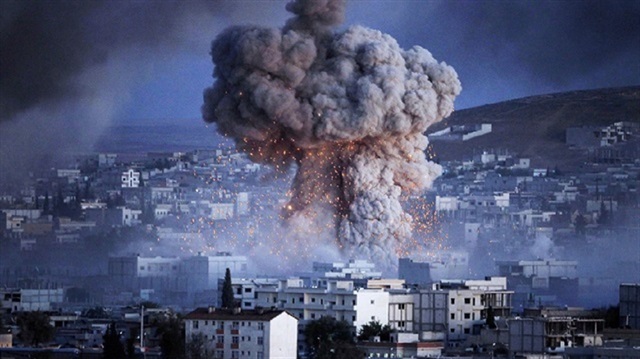
The proposed political process will leave Syria looking very different from when the conflict started
As Turkey works to increase its military presence in northern Syria, regional powers’ exertions to fulfill their competing agendas in the war-torn region continue.
As the U.S. steps up its military support for Kurdistan Workers’ Party (PKK) terrorists, and reaches a ceasefire agreement with Russia, in a bid to launch a political process that leaves the country, which has been gripped by a six-year civil war, looking very different from when the conflict started.
Iran’s crucial goal in Syria is to secure a 900 kilometer logistical corridor with which it supplies Hezbollah in Lebanon with reinforcements.
As a result, Iran is working to reach a deal which guarantees that the U.S. will withdraw its special forces from the Iraqi border.
The Tehran administration will support establishing a PKK/PYD state in Syria, in return for the U.S. suspending its military support for the Free Syrian Army (FSA) in the Tanif region, according to reports.
Russia’s recent rapprochement with the U.S. in Syria has drawn a great deal of attention as a result of the ceasefire in southern Syria, which was announced after the two superpowers reached an agreement.
Russia, which is trying to secure its access to its bases on the mediterranean and the large underwater depots of oil and gas, is striving for a nationwide ceasefire in Syria.

After establishing 11 military bases in PKK-occupied regions of northern Syria, the U.S. wants to begin “political solution” talks during which it aims to quickly launch a process aimed at the federalization of Syria, backed by France who wants to make sure northern Syria remains under the control of PKK terrorists.

Turkey is working to foil the project that aims to establish a PKK terrorist state in northern Syria.
During and after the Euphrates Shield Operation, Turkey has set up close to 20 military bases in the region stretching from Jarabulus to Azaz, and recently embedded a large number of tanks and armored vehicles into Syria.
The Turkish Armed Forces (TAF) announced it will respond to PKK terrorists’ transgressions in the Euphrates Shield regions by preparing to launch an operation to seize the symbolic and strategic town of Afrin.
The PKK is listed as a terrorist organization by Turkey, the European Union and the United States.
The PKK has been conducting armed violence in the southeastern part of Turkey since 1984. More than 40,000 people, mostly civilians, have been killed in the three-decade long conflict.
Meanwhile, the process aimed at finding a political solution in Syria has been officially launched by the U.S., Russia and intelligence officials.
One of the initial plans sees Syria divided into three federal zones for Sunnis, Alawites and Kurds.
Turkey will oppose any plans in the establishment of a PKK terrorist state, while Iran wants the Baath regime to stay in power even if Assad leaves.
The post of president, which will be reserved for Sunnis, is expected to be filled by either Riyad Hijab, Firas Tlas or Manaf Tlas, all three of whom enjoy close relations with the U.S., Russia and France, and will play a major role in the upcoming process.
After clearing Mosul and Raqqa from Daesh terrorists, the U.S., with its allied Iraqi Army and Hashd al-Shaabi terrorists, has turned its focus to the ethnic Türkmen city of Tal Afar.
Thirty civilians lost their lives in the U.S.’s two-day bombardment of the city.
Prior to the civil war, the population of Tal Afar stood at 600,000 civilians. However, following the recent attacks, the city has turned into a ghost town.
Yeni Şafak spoke to Tal Afar resident Ahmed Shihlar about the attack launched by the coalition of U.S., PKK and Hashd al-Shaabi forces targeting the city of Tal Afar.
According to Shihlar, the city of Tal Afar is under intense aerial and ground bombardment which started last Tuesday. At noon the following Wednesday, a ground invasion attack was launched.
Prior to the war, the population of Tal Afar stood at 450,000 civilians, which has dwindled down to 80,000 today after Daesh seized control over the city, according to Shihlar.
According to the estimates of the U.S. and its allies, as they were preparing for the attack, around 25,000- 30,000 civilians were living in Tal Afar.
Tal Afar, consisting mainly of Türkmens, located on the Syrian-Iraqi border, is of massive strategic importance due to its connection to both Syria and Iraq, making it a prime target for both Iran and the U.S. as they try to seize control over the city.
Mosul Representative of the Iraq Türkmen Front Adil Selbi called on Turkey to urgently take action to prevent the loss of Tal Afar, which could spell the end of the Türkmen presence in Iraq.
According to the Mosul Representative of the Iraq Türkmen Front Adil Selbi, dozens of of Iraqi Türkmens were martyred in the village of Allo after U.S. bombardment commenced.
“Within a few months, Tal Afar will be flattened, as was the case in Mosul. A technologically advanced superpower such as the U.S. is indiscriminately targeting civilians locations instead of striking headquarters of terrorist organizations,“ said Selbi.
Daesh terrorists, fleeing Tal Afar to areas under the control of Peshmerga forces, are being sent to Syria’s Deir Ezzor with the help of the Talibani-linked Patriotic Kurdistan Union (KYB) terrorists.
Bombs, weapons and munitions brought by Daesh terrorists from Mosul are being sold to PYD/PKK terrorists through Peshmerga forces.

Ibrahim Himmetoğlu, responsible for Tal Afar refugees, says that as a 110,000-strong army is being prepared; to seize Tal Afar; for a genocide similar to the ones in Mosul and Kirkuk; and to carry out civilian massacres after demolishing the city.
Himmetoğlu called on the international community to intervene before Mosul-style massacres and destruction occurs, warning that Tal Afar’s Türkmens will fall victim to those who want to forcefully alter Iraq’s demographic make-up.









